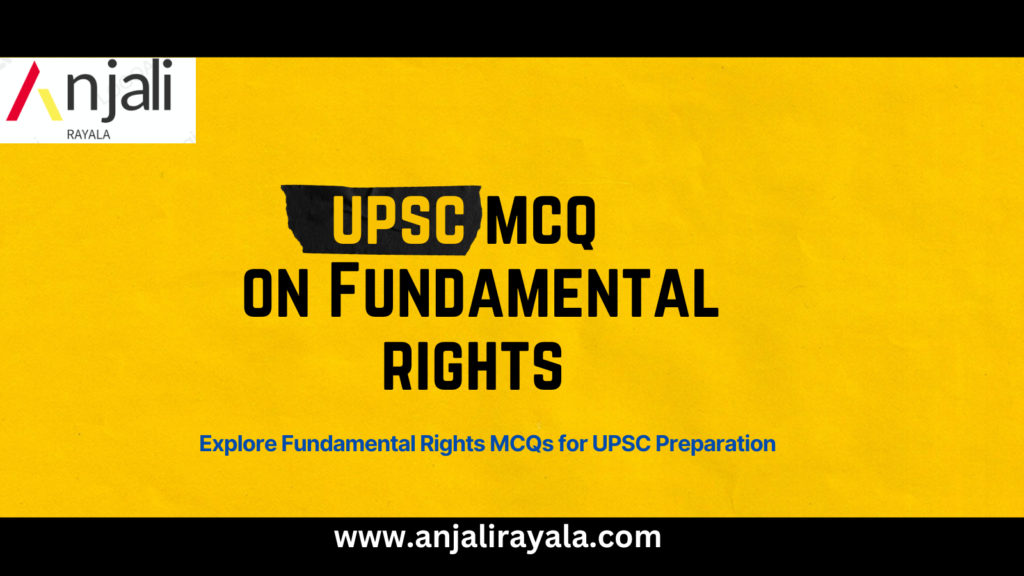Preparing for the UPSC exam requires a thorough understanding of the Indian Constitution, particularly the Fundamental Rights enshrined in it. Fundamental Rights are a crucial topic for both Prelims and Mains. Here, we present a comprehensive guide to help aspirants master this topic through multiple-choice questions (MCQs). This article focuses on UPSC MCQ on Fundamental Rights, providing clarity and practice for better exam performance.
An outline of the Indian Constitution’s fundamental rights
Fundamental rights are enshrined in Articles 12 to 35 of Part III of the Indian Constitution. These rights are essential for the holistic development of individuals and ensure equality, freedom, and justice. Currently, the Constitution guarantees six Fundamental Rights, which include:
- Right to Equality (Articles 14-18)
- Right to Freedom (Articles 19-22)
- Right against Exploitation (Articles 23-24)
- Right to Freedom of Religion (Articles 25-28)
- Cultural and Educational Rights (Articles 29-30)
- Right to Constitutional Remedies (Article 32)
Each of these rights forms the backbone of India’s democratic framework and is protected by the judiciary.
Important MCQs on Fundamental Rights for UPSC preparation.
Here are some vital MCQs on Fundamental Rights with answers to aid your UPSC preparation:
1. Fundamental Rights are enshrined in which part of the Indian Constitution?
a) Part I
b) Part III
c) Part IV
d) Part V
Answer: b) Part III
2. How many fundamental rights does the Indian Constitution currently guarantee?
a) 6
b) 7
c) 8
d) 9
Answer: a) 6
3. Which provision of the Indian Constitution outlaws untouchability?
a) Article 15
b) Article 16
c) Article 17
d) Article 18
Answer: c) Article 17
4. Which Article ensures the Right to Equality before the law?
a) Article 14
b) Article 15
c) Article 16
d) Article 18
Answer: a) Article 14
5. The Right to Freedom of Religion is covered under which Articles?
a) Articles 25 to 28
b) Articles 19 to 22
c) Articles 29 to 30
d) Articles 32 to 35
Answer: a) Articles 25 to 28
6. Which Article gives people the right to petition the Supreme Court to have their fundamental rights upheld?
a) Article 31
b) Article 32
c) Article 33
d) Article 34
Answer: b) Article 32
Importance of Fundamental Rights in UPSC Preparation
Grasping the concept of Fundamental Rights is crucial for effectively addressing the Polity and Governance section of the UPSC exam. Here’s why:
- High Weightage in Prelims: Questions based on Articles, case laws, and applications of Fundamental Rights frequently appear in the Prelims.
- Relevant for Mains: In the General Studies II paper, aspirants are required to analyze and critique the implementation of these rights.
- Practical Knowledge: Knowledge of Fundamental Rights helps in essay writing and ethical case studies for the Mains.
Additional MCQs for Practice
7. The Right to Education is enshrined under which Article?
a) Article 19
b) Article 20
c) Article 21A
d) Article 23
Answer: c) Article 21A
8. Protection against self-incrimination is guaranteed under which Article?
a) Article 19
b) Article 20(3)
c) Article 21
d) Article 22
Answer: b) Article 20(3)
9. Which Article prohibits the employment of children below 14 years in hazardous industries?
a) Article 21
b) Article 23
c) Article 24
d) Article 25
Answer: c) Article 24
10. Cultural and Educational Rights are enshrined in which Articles?
a) Articles 19 to 22
b) Articles 25 to 28
c) Articles 29 and 30
d) Articles 32 and 33
Answer: c) Articles 29 and 30
11. Which Fundamental Right prohibits discrimination on the grounds of religion, race, caste, sex, or place of birth?
a) Article 14
b) Article 15
c) Article 16
d) Article 18
Answer: b) Article 15
12. Which Fundamental Right is considered the “Heart and Soul of the Constitution”?
a) Right to Equality
b) Right to Constitutional Remedies
c) Right to Freedom
d) Right to Religion
Answer: b) Right to Constitutional Remedies
Tips for Mastering Fundamental Rights for UPSC
- Memorize Articles: Ensure you remember which rights are covered under each Article.
- Understand Landmark Cases: Familiarize yourself with cases like Kesavananda Bharati v. State of Kerala and Maneka Gandhi v. Union of India.
- Focus on Application: Be prepared to answer situational questions about the implementation and violation of Fundamental Rights.
- Regular Revision: Keep revisiting MCQs to strengthen your grasp on this topic.
Conclusion
Start practicing today and take one step closer to cracking the UPSC exam!



